Lives in the Asylum

A collection of four stories gathered on the Longreads blog site.
1. "Something More Wrong" (Katherine B. Olson, The Big Roundtable, July 2013)
2. "Mentally Unfit" (Zachary McDermott, Gawker, April 2014)
3. "My Lovely Wife in the Psych Ward." (Mark Luckach, Pacific Standard, January 2015)
4. "Mr Bad Weekend" (Alan Hanson, Matter, January 2015)
Chomsky and Developmental Language

Her weblog: http://deevybee.blogspot.co.uk
Her Twitter feed: https://twitter.com/deevybee (@deevybee)
RIP George A. Miller

Determining Scientific Truth Online

- Learning to avoid confirmation bias
- Using Google, Snopes and other sites as a first line of defense
- Searching public journals and contacting science advocates
- And, finally, visiting your local library and consulting both librarians and reference materials there.
What Happened to the Girls in Le Roy?
| "Before the media vans took over Main Street, before the environmental testers came to dig at the soil, before the doctor came to take blood, before strangers started knocking on doors and asking question after question, Katie Krautwurst, a high-school cheerleader from Le Roy, N.Y., woke up from a nap. Instantly, she knew something was wrong. Her chin was jutting forward uncontrollably and her face was contracting into spasms. She was still twitching a few weeks later when her best friend, Thera Sanchez, captain of one of the school's cheerleading squads, awoke from a nap stuttering and then later started twitching, her arms flailing and head jerking. Two weeks after that, Lydia Parker, also a senior, erupted in tics and arm swings and hums. Then word got around that Chelsey Dumars, another cheerleader, who recently moved to town, was making the same strange noises, the same strange movements, leaving school early on the days she could make it to class at all. The numbers grew--12, then 16, then 18, in a school of 600--and as they swelled, the ranks of the sufferers came to include a wider swath of the Le Roy high-school hierarchy: girls who weren't cheerleaders, girls who kept to themselves and had studs in their lips. There was even one boy and an older woman, age 36…" |
Blog & News Media Roundup (April 2-9, 2009)
New York Times
- Brain Researchers Open Door to Editing Memory • Benedict Carey • 2009045 • “Suppose scientists could erase certain memories by tinkering with a single substance in the brain. Could make you forget a chronic fear, a traumatic loss, even a bad habit. Researchers in Brooklyn have recently accomplished comparable feats, with a single dose of an experimental drug delivered to areas of the brain critical for holding specific types of memory, like emotional associations, spatial knowledge or motor skills.“
- When All You Have Left Is Your Pride • Benedict Carey • 20090406 • “Keeping up appearances, psychologists say, is about much more than appearance...”
- A Life’s Journey in Neuroscience • 20090401 • “New Scientist has an excellent cover article on 'The five ages of the brain', looking at how the brain changes as we grow and how these transformations are reflected in our lives. It breaks the life span down into 'five ages', with a short article for each - tackling gestation, childhood, adolescence, adulthood and old age.”
- Solitary Confinement • 20090403 • “The New Yorker magazine has just published an important article questioning whether the widespread use of solitary confinement in the US prison system should be outlawed as a form of torture. It's an in-depth piece that piece that looks at numerous cases of people who have experienced solitary confinement first hand, either as hostages or legitimate prisoners, and discusses the psychological impact of this extreme form of social isolation”
- The Myth of Thomas Szasz? • 20090404 • “Psychiatrist and iconoclast Thomas Szasz takes part in a hard-hitting interview on ABC Radio National's All in the Mind where he shows that at the age of 89 he's lost none of his fire which has raged through psychiatry for almost 50 years. It's a two part interview with the second appearing next week and it's classic Szasz. He's an important thinker because he relentlessly attacks the conceptual foundations of psychiatry, the definitions which usually can't be empirically tested because they're philosophical issues - in other words, the assumptions we need to make about the world before we can start measuring anything.”
- Imaging the transgendered brain • 20090405 • “For the first time, the brain structure of male-to-female transsexuals has been investigated in living individuals using MRI brain scans, helping to fuel the debate over the possible neural basis of gender identity.”
- When dreams come to life • 20090408 • “But dreams can come to life and the effect is no less fantastical. In REM sleep behaviour disorder (RBD), normal sleep paralysis breaks down and sleepers act out their dreams - giving observers a remarkable insight into the dreaming mind. An article recently published in Neurology charted the range of sleep behaviours seen in people with neurological disturbances such as narcolepsy, Parkinson's disease or other types of dementia, all of which can trigger the problem.”
- Stress, Poverty, Working Memory • 20090402 • “A new study has demonstrated, once again, that being poor is stressful, and that chronic stress is poison for the brain.”
- Money Illusion • 20090403 • “This is known as the money illusion, since people appear more likely to think about money in nominal rather than real values. In other words, we forget that money is subject to inflation, and that a dollar can mean different things at different times...A new paper by a team of German neuroscientists and economists outlines the cortical anatomy underlying this profound violation of the rational agent model.”
- Investing in the Developing Brain • 20090408 • But there has been one major payoff from our investigations of the brain: an increasing emphasis on educating young children, before they reach kindergarten. Decades of research have demonstrated that the cortex is astonishingly plastic at a young age and that many important traits and habits seem to solidify before the age of 4. (This isn't to discount the power of plasticity in the adult brain - it just takes a lot more work to make it happen.) When combined with the brilliant work of James Heckman, this research led policymakers to realize that investing in pre-K education had an incredibly high-rate of return.”
- Do Parents Matter? • 20090409 • “Over at Mind Matters, I've got an interview with Judith Rich Harris, author of the influential and infamous The Nurture Assumption, which provocatively argued that parents aren't particularly important when it comes to determining the behavior of their children, at least outside of the home. Instead, Harris argued that the most important variable was the child's peer group.”
- Stress and Sadness • 20090409 • “Sometimes, the human brain can seem astonishingly ill-equipped for modern life. Our Pleistocene olfactory cortex craves glucose and lipids, which makes us vulnerable to high-fructose corn syrup and Egg McMuffins. We've got an impulsive set of emotions, which makes us think subprime mortgages are a good idea. And so on. If I could only fix one design flaw, however, I'd focus on our stress response. We're stuck with a mind that reacts to the mundane mundane worries of modern life - a falling stock market, a troubled marriage, taking the SAT - with a powerful set of primal chemicals that, once upon a time, were reserved for moments of "fight or flight". In other words, we treat everything like an existential threat, which is why a multiple choice exam can leave us panicky and breathless...The problem with this blunt reaction to stress - it's too often all or nothing - is that, as I've written numerous times, chronic stress is really bad for you. It causes chronic back pain, weakens the heart and kills brain cells.”
- Even isolated cultures understand emotions conveyed by Western music • Dave Munger • 20090408 • “The researchers say this shows that at least some portion of music appreciation may be universal. The more dramatic effects among Western listeners suggest that cultural influences may also contribute, but some basic part of the the way we understand music may be shared by everyone, no matter what we have learned from our culture.”
- Possibility Of Brain Scan-assisted Diagnosis For PTSD A Step Closer • 20090406 • “Preliminary research examining the difference in brain activity between soldiers with post-traumatic stress disorder and those without it moves scientists a step closer to the possibility of being able one day to use brain scans to help diagnose the condition...”
- Depression in Teenagers: Experts Say to Screen All • Lindsay Lyon • 20090407 • “The subject of depression in teenagers was thrust into the national dialogue recently when a government-appointed panel of medical experts advised that primary-care doctors routinely screen all patients ages 12 to 18 for major depression, an about-face from a 2002 conclusion that there was insufficient evidence to recommend for or against doing so. Now, the U.S. Preventive Services Task Force says in April's Pediatrics, there's "adequate evidence" that screening tests do a good job of accurately detecting depression in teenagers and adolescents—important, it says, since "the majority of depressed youth are undiagnosed and untreated.’ “
Back Again (with Narrative and the Body)
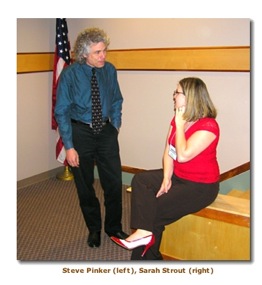
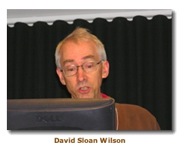
My paper attempts to explore the ways in which the narrative perspective in psychology might enter into a fruitful dialogue with evolutionary psychology despite the almost complete absence of recognition of each subarea in psychology by the other. I also suggest a kind of lingering Cartesianism that may affect both narrative and evolutionary perspectives. When I got home from the conference I did an awful lot of additional investigation of evolutionary models and biological research pertaining to narrative. The published paper expands significantly on each of my four points of contrast compared to what I had the chance to review at the conference. I got the paper out to the journal for review just in the nick of time and was really happy when the word came back of acceptance by the editors with only minor revisions.
Browsers of this blog can look over the scope of the articles in the special issue at this link and can download my own article in pdf format at this link. The article runs 17 printed pages.
Reference
- Hevern, V. W. (2008). Why narrative psychology can't afford to ignore the body (Special issue: Proceedings of the 2nd annual meeting of the NorthEastern Evolutionary Psychology Society). Journal of Social, Evolutionary, and Cultural Psychology, 2(4), 217-233. Available from http://www.jsecjournal.com/archive2-4.htm
Denial Is Certainly More Than a River in....So Say The Psychologists

The New York Times has a thought-provoking article today by Benedict Carey on the role of denial in the daily social lives of ordinary people. So much more than the relatively primitive defense mechanism described by Freud and his adherents, denial appears to be central to the ways in which our social lives are rendered tolerable. The crucial summary in Carey's article notes
I could not help but be struck by the way in which this article suggests in preliminary fashion an understanding of how scandals may arise among those in positions of authority or by those who "should have known better." I am thinking both about what goes on in the political world as well as the religious one as well. The doleful news that the Jesuits in the Oregon Province have just agreed to a $50 million settlement for the abuse that went on in the Alaskan mission during the past forty or so years is haunting. The painful reality that the victims experienced seems so obvious now that a final explanation of malice and sheer injustice by Jesuit superiors seems almost inescapable. But, if the work cited by Carey here among social psychologists is accurate, then a more nuanced understanding may eventually begin to emerge to explain the failure of the Church and its superiors in this horrendous scandal. Toward the end of his report, Carey summarizes: "In short, social mores often work to shrink the space in which a conspiracy of silence can be broken: not at work, not out here in public, not around the dinner table, not here. It takes an outside crisis to break the denial, and no one needs a psychological study to know how that ends." This seems like something that we'll need to think about very hard in the years ahead.Yet recent studies from fields as diverse as psychology and anthropology suggest that the ability to look the other way, while potentially destructive, is also critically important to forming and nourishing close relationships. The psychological tricks that people use to ignore a festering problem in their own households are the same ones that they need to live with everyday human dishonesty and betrayal, their own and others’. And it is these highly evolved abilities, research suggests, that provide the foundation for that most disarming of all human invitations, forgiveness. In this emerging view, social scientists see denial on a broader spectrum — from benign inattention to passive acknowledgment to full-blown, willful blindness — on the part of couples, social groups and organizations, as well as individuals. Seeing denial in this way, some scientists argue, helps clarify when it is wise to manage a difficult person or personal situation, and when it threatens to become a kind of infectious silent trance that can make hypocrites of otherwise forthright people.
Reference
Carey, B. (2007, November 20). Denial makes the world go round (Electronic version). New York Times. Retrieved from http://www.nytimes.com/2007/11/20/health/research/20deni.html?ex=1353301200&en=d185b9c072a51a1f&ei=5124&partner=permalink&exprod=permalinkThe Internet and Children: What's the Impact?
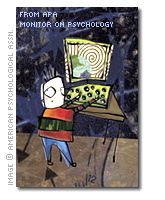
- "It's Fun, but Does It Make You Smarter?" (Internet use and academic performance)
- "Socially Wired" (Instant messaging & email; friendships; how much is too much?)
- "Web Pornography's Effects on Children" (Development of unhealthy attitudes toward sex)
- "Creating a Place for MySpace" (Advice for parents)
Washoe, 42, Dies
In the four decades since Washoe's adoption, researchers from a variety of universities and perspectives have worked to establish the parameters of animal (particularly primate) language abilities and the potential for animal-human communications. As Dr. Rosalyn King has summarized on her website, these efforts extend beyond Washoe and the team at Central Washington University to include important projects such as Sue Savage-Rumbaugh with Kanzi, Duane Rumbaugh (Georgia State University) and the Language Research Center, Matsuzawa Teturo and the chimp, Ai (Primate Research Institute, Kyoto University, Japan) and several others.
The success of these efforts has been highly disputed by such linguistic and psychological scholars as Noam Chomsky and Steven Pinker. Neither of them believe that these primates have actually learned an actual language rather than a sophisticated series of behaviors which receive reinforcement such as feeding. Some researchers have concluded that primates fail to use sign language spontaneously, an observation which undermines the notion of real language learning. Nevertheless, those who have worked with animals such as Washoe argue that their charges learn language at the level similar to the abilities of a 2 1/2 year old human child. Obviously the debate will continue. For now, though, one of the founding figures of these conversations will no longer take part in them
Resources
Alex the Parrot
- NPR Alex the Parrot, an Apt Student, Passes Away (Sept. 10, 2007)
- The Alex Foundation
- Alex (parrot) [Wikipedia]
- The Alex Foundation
- New York Times: Notebook - Alex the Parrot (Verlyn Klinkenborg, Sept. 12, 2007)
- New York Times: Alex, a Parrot Who Had a Way With Words, Dies (Benedict Carey, Sept. 10, 2007)
Washoe
- Washoe (chimpanzee) [Wikipedia]
- Great Ape Language [Wikipedia]
- Chimpanzee-Human Communications Institute (CHCI, Central Washington University)
- Friends of Washoe @ CHCI
- New York Times: Washoe, A Chimp of Many Words, Dies at 42 (Benedict Carey)
APA San Francisco (Fri): The Question of Torture
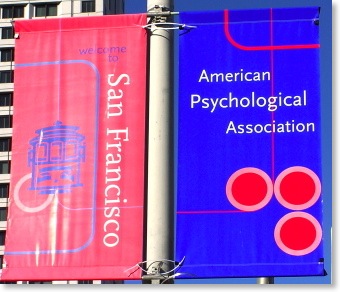
The pressing issue of this convention turns out to be the question of the torture of prisoners by the United States government's forces in places like Guantanamo Bay, the involvement of psychologists in developing or advising about interrogation techniques which are torturous, and the ethical lapses or failures of both these psychologists and the American Psychological Association itself in rejecting such activities. My first session this morning involved a symposium/discussion on the topic: "Ethics and Interrogations-Confronting the Challenge: What Does the Research on
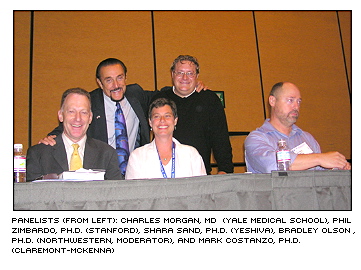


Later in the day, there was a demonstration in the Yerba Buena Gardens across from Moscone South by Psychologists for an Ethical APA. The crowd it attracted seemed to me to consist of about 200-300 pretty committed and enthusiastic. On Sunday morning, the APA Council of Representatives is going


